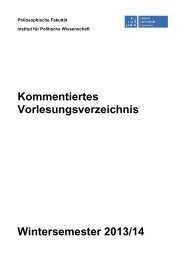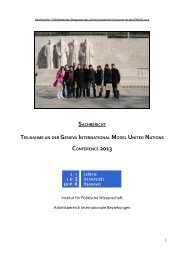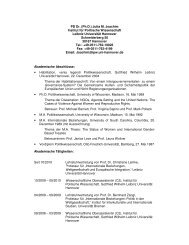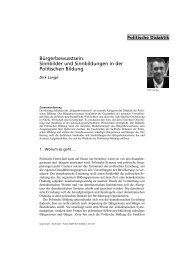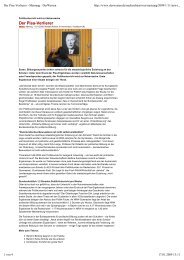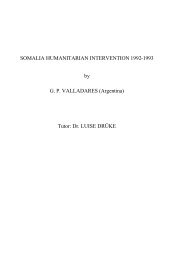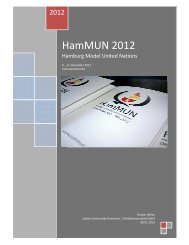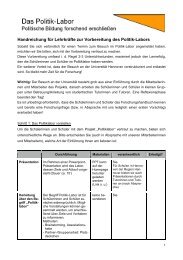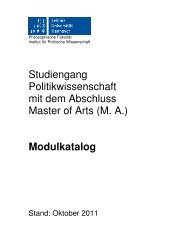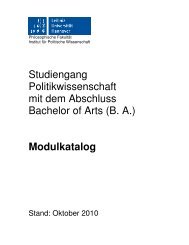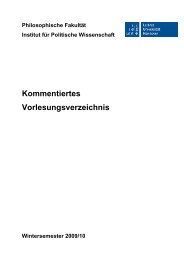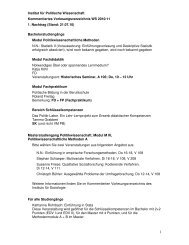Preventive Action for Refugee Producing Situations
Preventive Action for Refugee Producing Situations
Preventive Action for Refugee Producing Situations
Create successful ePaper yourself
Turn your PDF publications into a flip-book with our unique Google optimized e-Paper software.
158 Chapter 4<br />
The first such operation was created in the Middle East in 1948 in the<br />
<strong>for</strong>m of an observer mission. The first of the United Nations peacekeeping<br />
<strong>for</strong>ces was created also in the Middle East, in 1956. 365 On 10 December<br />
1988, the Secretary-General accepted the Nobel Peace Prize in Oslo on<br />
behalf of United Nations peace-keepers. With him were seventeen Blue<br />
Berets representing United Nations operations in the field.<br />
At the opening session of the Follow-up Meeting of the Conference<br />
on Security and Cooperation in Europe (CSCE) in Helsinki on 24 March<br />
1992, the Secretary-General transmitted a message through Mr. Sotirios<br />
Mousouris, the Assistant Secretary-General <strong>for</strong> Political Affairs. This<br />
message underlined that the CSCE and the UN share similar ideals and<br />
face common challenges and priorities and actions regarding peace and<br />
security, such as preventive diplomacy, disarmament, economic and social<br />
development, human rights and democracy. Mr. Boutros Ghali referred to<br />
the division of labor between the UN and the European Community <strong>for</strong><br />
peace-keeping and peace-making ef<strong>for</strong>ts, respectively. He also referred to<br />
a recent dispatch of UN fact-finding missions to Nagorno-Karabakh,<br />
which is intended to complement the CSCE in its peace-making ef<strong>for</strong>ts. 366<br />
A few days be<strong>for</strong>e that, on 19 March 1992 in the UN Headquarters in<br />
New York, the Secretary-General gave his first press conference. He<br />
reiterated one of his priorities: rein<strong>for</strong>cing regional cooperation<br />
mechanisms <strong>for</strong> conflict management and making a clear division of<br />
labor. For example, a division between the European Community and the<br />
United Nations <strong>for</strong> dealing with peace-making, and with peacekeeping/maintaining<br />
the cease-fire, respectively. He sees the UN role as a<br />
complementary one: through cooperation with the different regional<br />
bodies to promote preventive diplomacy and even a kind of<br />
decentralization in the different peacekeeping operations.<br />
When asked about peace and development, the Secretary-General<br />
mentioned two interesting cases, El Salvador and Cambodia, where the<br />
role of the UN is not limited to peacekeeping, but where the UN is<br />
moving to the second stage, which is the construction of peace through<br />
development. In this connection Mr. Boutros- Ghali reminded his<br />
audience that a great majority of the 77 military conflicts have taken<br />
______________________<br />
365 The Blue Helmets, A Review of United Nations Peace-keeping, Second<br />
Edition, United Nations, New York, 1990, p. 13.<br />
366 SG/SM/4723 - DC/2399, 27 March 1992, Secretary-General stresses<br />
concerns of UN and CSCE in message to Helsinki Follow-up meeting, DPI<br />
UN, New York.<br />
New Approaches and Policies 159<br />
place in the countries of the Third World during the past 45 years. There<strong>for</strong>e,<br />
it is essential that the UN maintain a close relation between peace-keeping<br />
and peace-building.<br />
Discussions and practical ef<strong>for</strong>ts to invigorate peace-keeping and<br />
cooperation between the UN and regional organization have so far had<br />
limited success. There<strong>for</strong>e, a new operation is just starting in Somalia to bring<br />
military protection and humanitarian aid. Only recently, the General<br />
Assembly urged the United Nations:<br />
[...] to provide such technical assistance as may be appropriate to the Organization of<br />
African Unity should the latter decide to launch a peace-keeping operation. 367<br />
a) Peace-keeping:<br />
According to Mr.Goulding, Under Secretary-General of the UN in charge of<br />
peace-keeping, there are two kinds of peace-keeping operations. The classic<br />
operation is to help "create the conditions in which negotiations can go on",<br />
usually by helping maintain the cease-fire at the end of a war. The newer<br />
type, seen in Namibia, Cambodia, Western Sahara and El Salvador, <strong>for</strong>ms<br />
part of a political settlement which has already been negotiated but requires<br />
an impartial third party to oversee its implementation. He regards the process<br />
in El Salvador, where he worked very closely with his "peace-making"<br />
colleague Mr. Avaro de Soto, as a model; by contrast, Mr. Goulding explains<br />
the arrangements in Western Sahara, negotiated in great secrecy by the<br />
Secretary-General's special envoy Mr. Issa Diallo as a disaster. 368<br />
Peace-keeping is in great demand these days. There are 12 operations,<br />
including the unprecedently ambitious task of bringing peace and<br />
reconstruction to Cambodia, that involves supervising both the existing<br />
administration and the election of a new one. The cost of this Cambodia<br />
operation alone is estimated to be $1.9 billion.<br />
i) What are the problems and means to prevent conflicts?<br />
There are two crucially important problems which actually hinder the UN to<br />
be as effective as it could if they did not exist:<br />
_________________________<br />
367 A/RES/46/20, 17 March 1992. Cooperation between the United Nations and the<br />
Organization of African Unity. Resolution adopted by the General Assembly.<br />
368 Edward Mortimer. Marrack Guolding, the UN's protector of a fragile peace,<br />
Financial Times, 29 February -1 March 1992.



